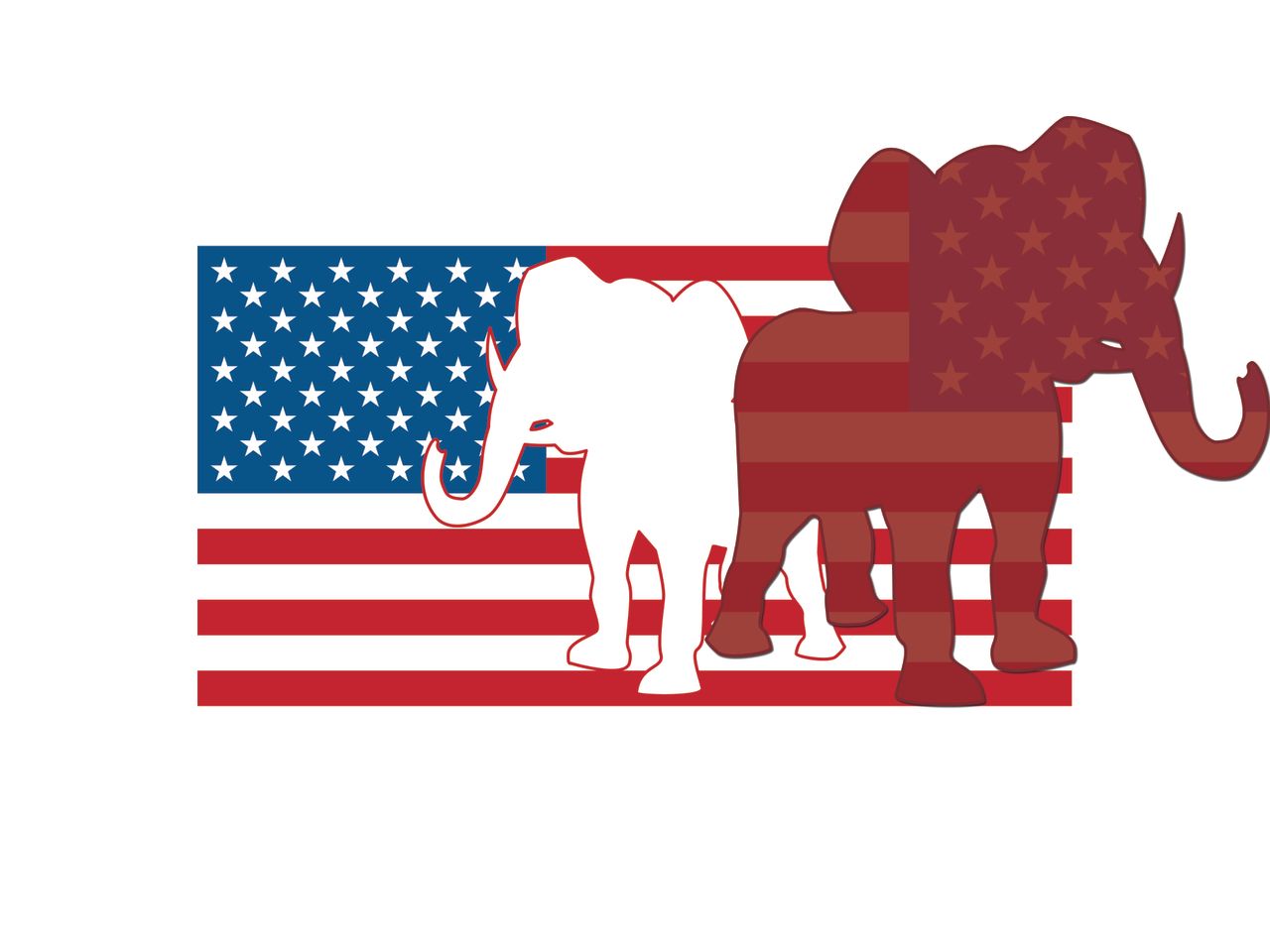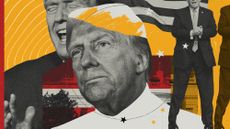How the GOP became a party of ideological extremism
How the GOP became a party of ideological extremism


As America’s two major political parties have evolved in the direction of philosophical purity over the past half century — with the Democrats emerging as the home of ideological progressivism and the Republicans as the font of ideological conservatism — it has become common for each to accuse the other of extremism.
Republicans call the Democrats strident socialists eager to bring about the End of Freedom in America, while Democrats accuse the Republicans of waging a War on Women, African-Americans, Hispanics, and just about anyone else who isn’t a Wealthy White Man. The vacuous centrism of inside-the-Beltway conventional wisdom then reinforces the pox-on-both-your-houses narrative, treating both sides as equally to blame for every failure to reach consensus and Get Things Done.
The reality is far less fair and balanced.
Subscribe to The Week
Escape your echo chamber. Get the facts behind the news, plus analysis from multiple perspectives.

Sign up for The Week's Free Newsletters
From our morning news briefing to a weekly Good News Newsletter, get the best of The Week delivered directly to your inbox.
From our morning news briefing to a weekly Good News Newsletter, get the best of The Week delivered directly to your inbox.
Over the past six years, Barack Obama has shown himself quite willing to compromise with Republicans, while Republicans have demonstrated over and over again that they have no interest in cutting deals with the president. (Number of Republicans in the House of Representatives to vote for President Obama’s 2009 stimulus bill? Zero. Number of House Republicans to vote for the Affordable Care Act? Zero. And so on.)
Whether this is because of the GOP’s principled opposition to Obama’s policies, or its Machiavellian conviction that the president is hurt more than the opposition party by inaction in Washington, or (more likely) some combination of the two, the end result is the same: The Democrats prove themselves to be a pragmatic, centrist party, while the Republicans consistently demonstrate no-holds-barred ideological stridency.
We saw further examples this past weekend, at the Iowa Freedom Summit, where a long list of GOP presidential hopefuls spoke to adoring crowds in Des Moines.
Texas Sen. Ted Cruz advocated an ideological litmus test: “Every candidate’s going to come in front of you and say, ‘I’m the most conservative guy to ever live.'” But “talk is cheap,” he insisted. “Show me where you stood up and fought.”
Now imagine a liberal presidential candidate taunting fellow Democrats, daring them to demonstrate their progressivism and willingness to stand up and fight for it.
Unlikely.
Wisconsin Gov. Scott Walker, meanwhile, plans to build a national campaign “on his record of defying teachers’ unions.”
Now imagine a Democrat building a national campaign on a record of defying police unions.
It wouldn’t happen.
Then there was rabble-rousing neurosurgeon Ben Carson, who promised that he would dismantle ObamaCare “even if it worked.”
Now imagine a Democrat showing an equal disdain for pragmatism by promising to prop up a government program “even if it doesn’t work.”
I don’t think so.
On and on it goes, with the GOP’s would-be presidential candidates competing to stake out the ideologically purest, most unambiguously right-wing position. An analogous scramble to the left just doesn’t happen among the Democrats — or at least it hasn’t happened since the time of the Reagan administration.
The question is why.
The answer has nothing to do with the machinations of party leaders or anything else that originates in Washington. On the contrary, the stance of each party reflects above all else the ideological makeup of its most loyal voters. And the fact is that in the United States, right-wing Republicans outnumber left-wing Democrats by a significant margin.
As the Pew Research Center showed last summer in an important report on political polarization, 22 percent of the general public identify as conservative (either socially or economically), while just 15 percent think of themselves as liberal.
Those are the relative sizes of each party’s ideological base.
The gap increases to 27 percent conservative and 17 percent liberal when highlighting registered voters. And it increases even further — to 36 percent conservative and 21 percent liberal — among the most “politically engaged” Americans.
Electorally speaking, Republicans are being pulled to the right by public opinion much more powerfully than Democrats are being pulled to the left.
This is one significant reason why the RealClearPolitics cumulative average of polls currently shows just 16 percent of Democrats supporting left-wing candidates (Elizabeth Warren or Bernie Sanders), while nearly double that percentage of Republicans (30 percent) favor right-wing options (Ben Carson, Mike Huckabee, Scott Walker, Ted Cruz, or Rick Perry).
It’s also one important reason why Hillary Clinton — a candidate only a right-wing Republican could consider a radical lefty — currently enjoys 61 percent support among Democrats, while the more moderate Republicans (Mitt Romney, Jeb Bush, Chris Christie, and Marco Rubio) receive a comparatively lukewarm combined total of 43 percent. (I’ve left Rand Paul, with 6.8 percent, out of both camps because his positions defy tidy ideological categorization.)
The GOP is a party increasingly being steered by its most stridently ideological voters. Which is one reason (among many others) why I won’t be voting for a Republican anytime soon.
Sign up for Today's Best Articles in your inbox
A free daily email with the biggest news stories of the day – and the best features from TheWeek.com
Damon Linker is a senior correspondent at TheWeek.com. He is also a former contributing editor at The New Republic and the author of The Theocons and The Religious Test.
-
 Things Donald Trump has said about women
Things Donald Trump has said about womenIn Depth The president has a long history of controversial remarks about the opposite sex
By Rafi Schwartz, The Week US Published
-
 The safety of air travel in the 21st century
The safety of air travel in the 21st centuryThe Explainer Recent accidents have shaken faith in flying for some but commercial jets remain one of the safest modes of transport
By Sorcha Bradley, The Week UK Published
-
 Food nostalgia: a feast down memory lane
Food nostalgia: a feast down memory laneIn the Spotlight Why Britons have an increasing taste for favourite old dishes
By Rebekah Evans, The Week UK Published
-
 Will Trump's 'madman' strategy pay off?
Will Trump's 'madman' strategy pay off?Today's Big Question Incoming US president likes to seem unpredictable but, this time round, world leaders could be wise to his playbook
By Sorcha Bradley, The Week UK Published
-
 US election: who the billionaires are backing
US election: who the billionaires are backingThe Explainer More have endorsed Kamala Harris than Donald Trump, but among the 'ultra-rich' the split is more even
By Harriet Marsden, The Week UK Published
-
 US election: where things stand with one week to go
US election: where things stand with one week to goThe Explainer Harris' lead in the polls has been narrowing in Trump's favour, but her campaign remains 'cautiously optimistic'
By Harriet Marsden, The Week UK Published
-
 Is Trump okay?
Is Trump okay?Today's Big Question Former president's mental fitness and alleged cognitive decline firmly back in the spotlight after 'bizarre' town hall event
By Harriet Marsden, The Week UK Published
-
 The life and times of Kamala Harris
The life and times of Kamala HarrisThe Explainer The vice-president is narrowly leading the race to become the next US president. How did she get to where she is now?
By The Week UK Published
-
 Will 'weirdly civil' VP debate move dial in US election?
Will 'weirdly civil' VP debate move dial in US election?Today's Big Question 'Diametrically opposed' candidates showed 'a lot of commonality' on some issues, but offered competing visions for America's future and democracy
By Harriet Marsden, The Week UK Published
-
 1 of 6 'Trump Train' drivers liable in Biden bus blockade
1 of 6 'Trump Train' drivers liable in Biden bus blockadeSpeed Read Only one of the accused was found liable in the case concerning the deliberate slowing of a 2020 Biden campaign bus
By Peter Weber, The Week US Published
-
 How could J.D. Vance impact the special relationship?
How could J.D. Vance impact the special relationship?Today's Big Question Trump's hawkish pick for VP said UK is the first 'truly Islamist country' with a nuclear weapon
By Harriet Marsden, The Week UK Published